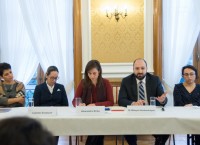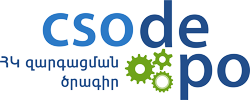
Հայաստան-ԵՄ հարաբերություններ։ Չլուծված խնդիրներ կամ չօգտագործված հնարավորություններ
Source: www.democracyendowment.eu
The Eurasia Partnership Foundation (EPF) and the European Endowment for Democracy hosted an expert discussion on Armenia-EU relations on 11 January 2017 – a timely juncture in view of forthcoming elections and Armenia-EU agreement developments.

Ahead of the parliamentary elections set for April and the new Armenia-EU framework agreement, under negotiation since December 2015 and soon to be signed, speakers and participants discussed major obstacles hindering reform and progress, and provided recommendations for the country’s future development.
Artak Ayunts, conflict analysis and transformation specialist at EPF, reflected on the unresolved Nagorny-Karabakh conflict. He put forward several recommendations to overcome the current situation of “no war and no peace”, including:
- cross-border confidence-building measures
- proper monitoring of the ceasefire agreement with a set of mechanisms to trigger if violated
- more education and training to tackle hate speech
- increased contacts between civil society groups
He also spoke about Armenia-Turkey relations, drawing attention to the many examples of economic interactions and flows despite all obstacles, and suggesting possible impacts if the border were re-opened.
Mikayel Hovyannisyan, EPF specialist on EU-Armenia relations and former coordinator of the EaP Civil Society Forum Armenian National Platform, shared his insight on the importance of multi-track international diplomacy and described the key issues hindering reform.
Aside from systemic corruption, he underlined in particular the deep mistrust of civil society towards the authorities and the reform progress. He also highlighted the general population’s lack of knowledge about the EU and the various ways it supports Armenia.
From the human rights perspective, Isabella Sargsyan, EPF cross-border programme manager, criticised the Armenian political system as no different to other post-Soviet authoritarian regimes. While the internet is free and the Armenian civil society is vibrant, the government uses flexibility and mimicry techniques for repression, delaying reform and election fraud.
She concluded: “The good things we have are not thanks to but despite the government. The changes are due to individuals and civil society, supported by the US and EU Member States.”
Finally, EED country consultant Naira Sultanyan shed light on the relationship between NGOs and political parties. She explained that the legislation in Armenia allows NGOs to engage in political activities. However, while NGOs carry out a vital role and do a crucial job, the political responsibility lies with the political parties. This means that NGOs, having access to donor funding, should engage more with political parties and pro-actively share their knowledge and skills with them.
You can also watch the recording of the event here
